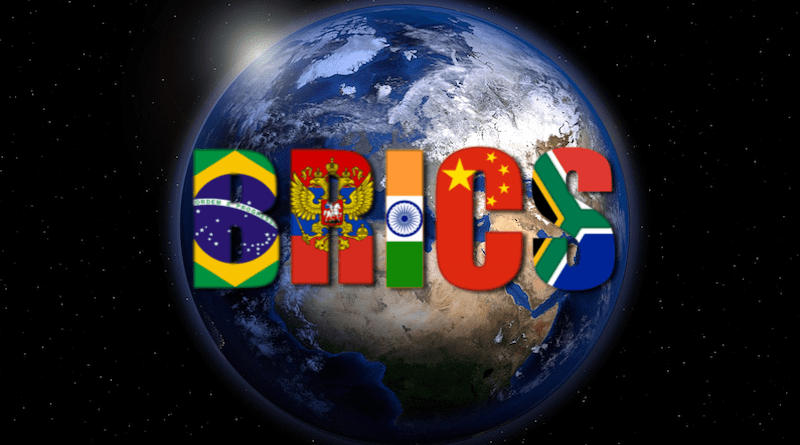Building BRICS: Why Are Saudi Arabia, Egypt And Turkey Considering Joining The Group? – Analysis
By Arab News
By Sinem Cengiz*
At a time when the organizations involved in global and regional cooperation seem to have lost momentum in their efforts to find tangible solutions to the conflicts, poverty, climate emergencies and food crises that many countries around the world are facing, BRICS is looking to expand and introduce an alternative global governance. At the same time, its attempts are considered a challenge to the existing world order.
BRICS is a heterogeneous organization composed of five major emerging economies: Brazil, Russia, India, China and South Africa. Established in 2006 by the first four countries, it was called BRIC until South Africa joined in 2010. The members hold summits every year and take turns hosting them; This year’s gathering was in Beijing and the 2023 summit is scheduled to take place in South Africa.
The member countries, which collectively represent about 27 percent of the world’s geographic area and are home to 42 percent of the global population, share significant structural features, such as rapidly growing economies, substantial military capabilities, and increasing political influence in global governance institutions.
According to the International Monetary Fund, China accounts for more than 70 percent of the group’s economy, India about 13 percent, Russia and Brazil about 7 percent each, and South Africa 3 percent.
Lately, BRICS has once again caught the attention of the media after the president of the organization’s International Forum, Purnima Anand, revealed that Saudi Arabia, Turkey and Egypt plan to approach BRICS about official membership. Her statement came soon after Russia’s announcement that Argentina and Iran had begun the preparatory process for joining BRICS. The applications are the first expansion move since South Africa joined more than a decade ago.
“All these countries have shown their interest in joining and are preparing to apply for membership,” Anand told Russian media. “I believe this is a good step because expansion is always looked upon favorably; it will definitely bolster BRICS’ global influence.”
She added that while Riyadh, Ankara and Cairo have “already engaged in the (BRICS membership) process,” she doubted that all three would join simultaneously.
During the 14th BRICS Leaders’ Meeting in Beijing in late June, Chinese President Xi Jinping emphasized the acceleration of the organization’s expansion process. In May this year, the foreign ministers of Kazakhstan, Saudi Arabia, Argentina, Egypt, Indonesia, Nigeria, Senegal, the UAE, Thailand and other guest countries attended a BRICS Foreign Ministers’ Meeting for the first time.
In 2018, Turkish President Recep Tayyip Erdogan was a guest at the 10th BRICS summit, in Johannesburg, during which he said: “I wish they (BRICS members) would take the necessary steps to let us (Turkey) in and we could take our place in BRICS.” He noted that Turkey considered the summit an opportunity to develop economic, investment and development cooperation, and that his country also aimed to enhance cooperation with BRICS nations in the energy field. Erdogan has also raised Turkey’s possible membership application during talks with Russian President Vladimir Putin.
Taken together, all these developments indicate that BRICS could see an expansion process but it might not happen overnight.
International media outlets are taking an interest in this possible trend. US magazine Newsweek, for example, said that as NATO’s “largest expansion in decades” takes place, “Beijing and Moscow were looking to take on new members” in their own blocs and BRICS was mentioned.
The impetus for a BRICS expansion has grown stronger against the backdrop of the ongoing conflict between Russia and Ukraine, intensifying competition between China and the US, and the increasingly intense confrontation between East and West.
Both East and West aim to consolidate their camps by expanding their networks of friends and partners. BRICS members aim to recruit “node” countries that occupy key strategic locations and growing economies. It is no surprise, therefore, that there is interest in bringing Turkey, Egypt and Saudi Arabia into the camp.
There is some debate about the potential contributions of these three countries, which have a combined population of about 220 million, to BRICS if they were to become permanent members. Much of the discussion has centered around material incentives, such as a variety of economic benefits, reduced dependence on other nations, and multifaceted foreign policy options.
Among the three, Saudi Arabia is one of the world’s largest exporters of crude oil, holding 15 percent of global oil reserves, and a founding member of the Organization of Petroleum Exporting Countries. Meanwhile, Russia is a member of OPEC+. This is a larger grouping that includes the 13 members of OPEC plus 10 other oil-producing nations, with the latter led by Russia.
Egypt, the largest of the three potential BRICS members in terms of population (about 102 million), is also an important petroleum producer and exporter.
Turkey, which has a population of more than 85 million, is a member of NATO and so occupies a unique position in the confrontation between East and West.
In the past decade, the trend in Turkish, Egyptian and Saudi relations with Russia, China and India has been positive and they are increasingly entwined in terms of trade and defense. Trade volumes between the two camps has risen significantly.
Although traditionally Western allies, Turkey, Saudi Arabia and Egypt have been actively seeking alternative partners. In part, their tilt toward China, Russia and India is a result of the changing role and position of the US in the region and the resulting shifts in relations with Washington.
BRICS membership might bring them political and economic benefits, but how the expansion process will actually play out remains to be seen.
- Sinem Cengiz is a Turkish political analyst who specializes in Turkey’s relations with the Middle East. Twitter: @SinemCngz

